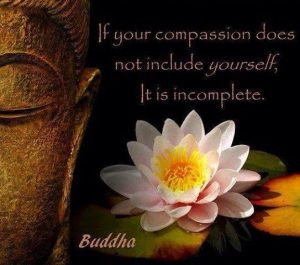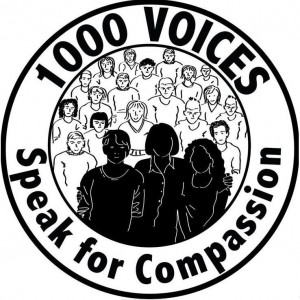1000 Speak – Reconciliation of the Self
“I suppose no man can violate his own nature.”
I would love to tell you those words are mine. I would love to tell you they fell from my consciousness onto the page and I breathed the wisdom of a lifetime into them.
I didn’t. They belong to the only mind they can, Ralph Waldo Emerson, and they are from my most beloved favorite of his essays, “Self-Reliance.”
It should be no surprise to you, dear reader, if my thoughts here are again on the topic of self-compassion. I have focused each month on a different aspect of self-compassion. For all forms of love and compassion spring only from love of self and compassion for the self.
This month the individual voices of the 1000 Voices Speak for Compassion group are talking and writing about compassion as it relates to connection and reconciliation.
I knew immediately what I would write when this topic was announced. I would write about reconciling the person you believed you would be with the person you actually are today. Yes, of course, because that’s precisely what I have been doing personally.
But for some reason the words would not come. And perhaps that’s appropriate. After all, it has taken me quite some time to discover myself. We like to throw around the idea of “reinventing” ourselves. It sounds exciting, doesn’t it? I propose that it isn’t re-invention at all, but rather a realization of what – or who – has always been present.
So let’s talk about our words for this month, connection and reconciliation. There is an intrinsic connection between the person I am today and the person I thought I might be today. I could get terribly verbose and tangled here, but instead let me just get right to the point. The connection is as easy as it is strong because these two versions of me are not different. They are simply different points in the process of self-discovery.
The premise for this post began with words long familiar…
“Nothing is at last sacred but the integrity of your own mind. Absolve you to yourself, and you shall have the suffrage of the world.”
~ Ralph Waldo Emerson, “Self-Reliance”
Understanding Emerson’s point requires us to look at some of his words more closely. The word sacred here, while often associated with God, more likely suggests something important to ourselves. The word absolve comes from the Latin absolvere, meaning “to set free.” Finally, suffrage must be placed in its nineteenth century context. In Emerson’s day, suffrage was used to mean approval or support.
The only reliable source for determining who you are meant to be is yourself. If you can accept and come to terms with the person and potential of your self, the rest will fall into place.
Often in life, though, people change. We grow and mature. We live through experiences that shape our beliefs and color the way we see ourselves and the way we see the world. Sometimes we find ourselves at a point so far deviated from our original expectations of self that we see contradiction. Emerson speaks to this as well.
“Speak what you think now in hard words and tomorrow speak what to-morrow thinks in hard words again, though it contradict every thing you said today.”
~ Ralph Waldo Emerson, “Self-Reliance”
If you realize what that your place is life is not right, change it. As humans, we possess the unique ability to learn and to make conscious choices about our existence. We have the capacity to change our path in life, adjust our beliefs, and affect the world around us.
Walt Whitman, too, addresses the question, stating simply that both past and present are but steps along the way to what – or who – is yet to be. If contradiction is present, Whitman tells us, embrace it. We contradict ourselves because we are complex beings.
“The past and present wilt – I have fill’d them, emptied them.
And proceed to fill my next fold of the future.”
“Do I contradict myself?
Very well then I contradict myself,
(I am large, I contain multitudes.)
~ Walt Whitman, Song of Myself (51)
Want more? Shakespeare says much the same centuries earlier when Polonius speaks to Laertes in Hamlet. Be true to your self and the rest falls into place.
“This above all: to thine own self be true,
And it must follow, as the night the day,
Thou canst not then be false to any man.”
~ Hamlet Act 1, scene 3, 78-82
Where does all of that leave us?
Be who you are. Be the person you were born to be. You may not know who that person is at first. You may believe you desire to be or to do one thing in particular and that may change over time. You may become something you never dreamed of when people asked, “What do you want to be when you grow up?”
Perhaps the better question is “What will you be when you grow into your Self”? It may take years or even decades to figure it out. You may find yourself looking in the mirror at everything you never imagined. It’s OK. All things have their season. (Emerson and Thoreau both talk about that, too.)
![20140803_161402[1]](http://www.themeaningofme.com/wp-content/uploads/2014/08/20140803_1614021-224x300.jpg)
Enjoy every step of the journey. Live deliberately and with purpose…reaching the full potential of your Self. And when you figure it out? When you reconcile the person you imagined with the person you are? Do as Whitman would. Stand where the hawks and eagles fly and shout it with a barbaric yawp from the rooftops of the world.
~~~~~~~~~~~~~~~~~~~~~~~~~~~~~~~~~~~~~~~~~~~~~~~~~~
This month, 1000 Voices Speak for Compassion continues to work toward a better world with a particular focus on Connection and Reconciliation, as well as the broader topic of compassion, always.
If you’ve written a post relevant to this month’s focus add it to the link-up right here by clicking the blue button below.
Want to get involved with 1000 Voices Speak for Compassion?
Join 1000 Voices Speak for Compassion on Facebook
Visit the 1000Speak blog
Follow @1000Speak on Twitter
Use the #1000Speak hashtag across social media.





FRIST
Yes, FRIST! By virtue of the time zone factor as well as the possibility that you may or may not have had insider information about it being live.
But who cares?
Frist is frist, baby! 😀
Oh SHUSH! It totally still counts. And I got the link from Bloppies, anyway. It was a fair cop!
😀
Lisa I am about to work but I have GOOSEBUMPS. This is stunningly beautiful and I’m gonna ‘yawp’ all morning and come back tnoight and yawp more.
YES YES YES – We are meant to grow, through life, to become more OURSELVES; the people we are meant to be.
I love this, and your shinybright soul, dear
I made myself cry writing this one. I love that you love it and I can’t tell you how happy that makes me.
And now that my Self has been up half the night pouring out these words, I am going to bed.
Have a wonderful day at work. Happy yawping!
I yawped aplenty today. You did SO GOOD with this. I still love it. I might need to read me some Walt Whitman and Ralph Waldo Emerson. SOON! Goodness me but this is SO inspiring 🙂
I love that you yawped! And thank you for loving this so much. I kind of love it, too.
Here’s the thing about Whitman and Emerson: they are so “American” (in some people’s eyes). And I’d agree that’s true. Much of their writing (Thoreau, too) is so particular to what was going on over here during that time period and if you look at it in that historical context, it makes perfect sense. However. I also think very strongly that their ideas have a universal appeal and a timelessness about them that can be applied to anyone, anywhere, at any time. Much of their writing is about defining who you are (much as America was doing at the time) and as you well know, that speaks loudly to me. So yes, read them. Some of my most love-worn and oft-recommended stuff.
I’ll see if I can find them. I’m no history buff and I doubt I’ll understand the context, but perhaps I’ll understand the themes of self 🙂 That’s my hope.
That’s what I mean…while the historical context makes it really pointed, you don’t need to understand that. Nor does it have to be applied there. The themes of self-discovery are there and are quite universal.
Lovely, Lisa, inside and out. The words of our American prophets, Whitman, Emerson, and did you throw in Thoreau as well? I know the words of these great philosophers are near and dear to your heart and living them and growing with them, extracting meaning and application from them is truly beautiful. Becoming oneself is an exciting journey and the learning never ends. (Still on the path). We need time to open, like the lotus.
Thank you, Val. I did not have Thoreau’s words in the mix here, but you know he is always close in my mind. And his ideas are never far from the sentiments of Emerson and Whitman, for sure. I love that the ideas expressed by each of them are not new – hence the nod to Shakespeare. And if we keep looking, we will find the same ideas over and over. Some ideas are timeless.
This is brilliant. I love the new question I will be pondering aa I reflect on who I am.
Lisa, I love that you’re taking that away with you. Makes my heart sing.
Emerson and Thoreau…Whitman and the father of all wise words: Shakespeare.
🙂
Love your wisdom in using all their reflections to lay the framework for your own.
When I was a child I wanted to be a librarian, then an artist, a psychologist and/or then a nurse.
I finally figured out I wanted to be a writer or travel blogger.
Now I am entering the decade of my thirties and all I want to be is happy.
Thanks for sharing your thoughts for May and 1000 Voices Speak. Heard yours. Loud and clear.
Thank you, Kerry. These are some of my favorite words. I am glad my words here have echoed with you today.
Hi Lisa, this post was so heartfelt and honest. While some subscribe to the philosophy that “people don’t change” I am a firm believer that the purpose of life is to participate in a sort of transformation. So many times in my life, I’ve found myself astounded that my previous self would have never approved. 🙂 I love that life is an unfolding. Keeps me waking up every day with excitement for all I might learn. 🙂 XO Shelah
That’s a great way to look at it, Shelah. Life is a never-ending journey. If you had asked me five years ago what I thought about the life I’m living now, I would have laughed out loud. But people do change, even if it doesn’t seem so. Thanks for coming over!
This is possibly your finest post (of those I’ve read.) Lots here to ponder. I love in particular that you included, “Absolve you to yourself, and you shall have the suffrage of the world.” And your explanation of it. Yes, come to terms with and accept ourselves and then the world agrees (or doesn’t) but it doesn’t matter. I find that this applies not just across all my life, but across aspects – the areas where I am least self-accepting are the areas where I see least acceptance from outside.
I also love what you included about contradictions. We all have them, it’s part of the human condition I think.
Wonderful post.
Yvonne, I don’t even know how to respond to your comment – wow. I’m floored. I felt like it was good when it came out. I did. But the reaction so far has been sort of surprising to me.
I think so much of the struggle we have is with ourselves, with reconciling who we are with who we want to be or whatever version of that you want to spin (and there are many). So much of the resolution comes from being open-minded enough to get in touch with what is really there beneath the surface. Sometimes that takes particular timing and circumstances. It all comes back to what you said – acceptance of ourselves. That’s hard for many.
Humans are so contradictory in nature because we have this dual nature – male/female, good/evil, strong/weak. That duality is what makes us unique, but also what makes us frustrated in many ways, too.
Thanks for your words. Made my heart happy. 🙂
Awesome! From what I’ve seen of the linkup, it was a good one this month (was looking at some of them early this morning).
Thanks for joining the #geekpasticheblog party! I’m surfing around visiting all the posts and collecting links today.
– Gene’O
Instigator-in-Chief at Sourcererblog
Thanks for the invite! I looked at a couple of things right away, but I want to get to more of them over the weekend.
Love the title – Instigator-in-Chief. That’s most excellent.
This was a fascinating read, ditto the comments. It seems to me that, speaking personally, it took me years to stop thinking about how others saw me and started to see myself through my own eyes. It’s not that I’m not conscious of the impression I make but rather it doesn’t define my anxieties and actions anything like as much as it did as a child, an adolescent or a nascent adult trying to find a place in the society I found myself in. Realising I had weaknesses that were entirely me and unlikely to disappear (a tendency to jealousy, an urge to please, an intolerance of some stupidities as I saw them) meant I could be aware of when they would occur, when they didn’t matter and when they might so I could adjust to control them meant I became more comfortable with the me that is me. Exactly as you have suggested through Emmerson’s wise words. It is so true – I haven’t actually changed, just become self aware and allowed for a lot more self compassion so I can admit the weaknesses rather than trying to bend others to meet my expectations. And the original list grows all the time as I pass through the seven ages of man – relationships impose new codas, children draw out new characteristics, responsibility for aging relative, introduces new dynamics but the self is better able to stand back and use the perspective of years to deal with them. And it is more enjoyable. I think it is truly gaining wisdom, this encompassing the true essence of self, as you have beautifully described it. Thank you
Geoff, thank you for your awesome awesome reply here. It makes me want to fist pump in the air and say YESSSSS!!! (OK, I might have just done that for real.) 😀 What you’ve outlined here is exactly the sort of thing I’m talking about. I am delighted that this post is resonating with those who’ve read.
This for me has been a life long struggle. I have found that forgiving oneself when one fails miserably at this and trying again is extremely important to the process and ever so difficult. Beautiful words. Thanks for sharing.
Thank you, Karen. I think everyone struggles with these things at some point, I’ve found. I agree that the most important – and challenging – thing is to see failure as opportunity for growth and learning. That is a sign of strength.
This ought to be required reading for me every 6 months. So wise.
Yeah, me too! Thank you. 🙂